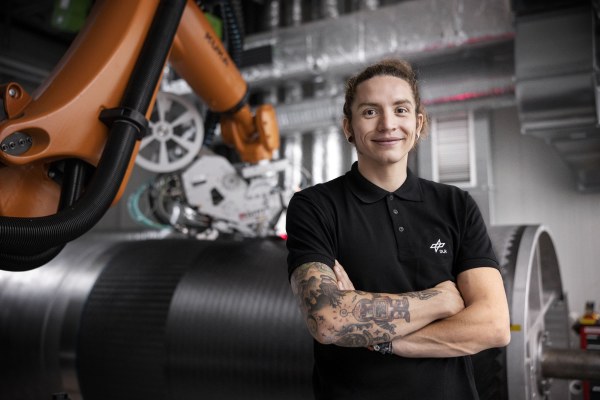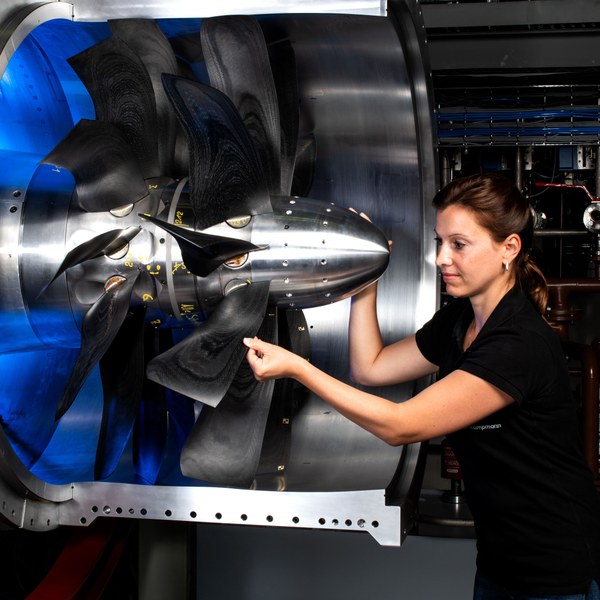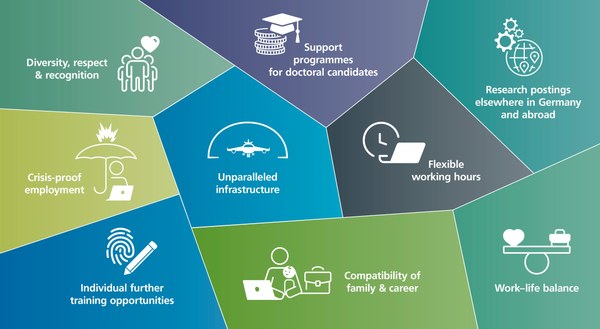Markus Krengel
Field of study: Aerospace engineering (M.Sc.), Mechanical engineering (B.Sc.)
Now: Institute of Aerodynamics and Flow Technology
Markus Krengel earned a Bachelor's degree in Mechanical Engineering and a Master's degree in Aerospace Engineering. In 2017, he joined the DLR Institute of Aerodynamics and Flow Technology in Braunschweig as a research engineer. Within the Transport Aircraft department, he specialises in overall aircraft design and aerodynamic design. In this interview, he shares insights about his work.
Markus, what do you look forward to when coming to work in the morning?
Markus: I look forward to the inspiring environment, whether in the office or during business trips. The continuous dialogue inspires creativity and motivates me to do dedicated research work. I particularly appreciate the personal, informal conversations that go beyond the scheduled meetings. This is of great value to me and my work.
What are you researching or working on?
Markus: To me, overall aircraft design represents a fascinating mix of technology and creativity. Instead of delving deeply into specific disciplines, I adopt an integrated approach to aircraft in my research. This requires wide-ranging expertise and an intuitive grasp of the primary technical parameters at play. At the same time, creativity is required in order to find new solutions and combine existing ones. At the Institute of Aerodynamics and Flow Technology, we place particular emphasis on multidisciplinary optimisation. The challenge? Understanding the complex aircraft system and improving it in terms of energy consumption and climate impact. We analyse the potential of different technologies, configurations and types of propulsion.
„The challenge? Understanding the complex aircraft system and improving it in terms of energy consumption and climate impact.“
What does your typical working day involve?
Markus: Although there is no 'typical' working day in my role, there are consistent elements that define my work. Aircraft design is inherently integrative and relies on collaboration and exchange. I frequently combine the latest findings from specialised disciplines, such as results from flight tests, wind tunnels or high-precision simulations. Collaboration is a pivotal aspect, and I regularly work with research institutes, universities and industry across Europe and sometimes even on a global scale. Programming scientific simulation tools is also a regular part of the work. In addition, I promote the exchange of knowledge through conferences, lectures and workshops. Mentoring pupils and students is also an important part of my work.

Where and how is your work being used?
Markus: My work offers insights into the interplay of disciplines in aircraft. I highlight both the technological potential and limitations of different technologies, always with a future-oriented perspective. The question of what the next generation of aircraft could look like is often relevant. The results of my work are therefore essential for well-founded discussions about the future. Alongside other findings, they also serve as fundamental reference point for both policymakers and stakeholders from industry, especially when it comes to shaping the path towards more environment-friendly and sustainable aviation.
„The results of my work are essential for well-founded discussions about the future“
What are the highlights of your work?
Markus: One of the genuine privileges of my work lies in the international exchange it offers. This collaboration not only enriches me on both a professional and personal level but also highlights the global significance of our research. The differing perspectives on aviation from different countries are fascinating. Another aspect that stands out to me is the opportunity to present our research to a wide audience through lectures and events. It is particularly rewarding to spark the interest of the next generation and to witness their enthusiasm for aviation.

What special skills can you make good use of in your job?
Markus: Once I’ve comprehended complex issues, I can explain them in a clear and simple manner.
Leave us a final thought.
Markus: Overall, DLR is an employer with an excellent international reputation and a wealth of opportunities. As a research organisation, there is ample freedom to help shape the direction of your work through your own initiative. Anyone wanting to play a part in the future development of aerospace is in good hands at Europe's largest national aerospace research organisation.




